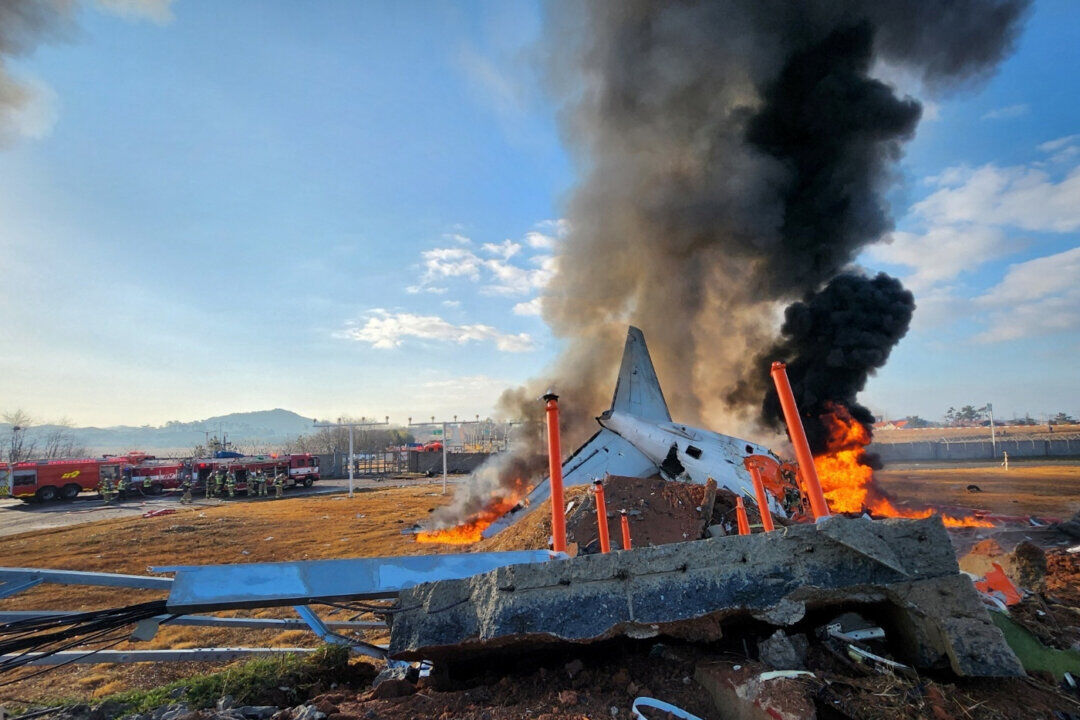The Jeju Air flight was carrying 175 passengers and six flight attendants.
A passenger plane on Sunday caught fire after a failed landing at South Korea’s Muan International Airport, killing at least 177 people.
Investigating authorities said the plane’s landing gear malfunctioned and failed to deploy during a second landing attempt, forcing the pilots to conduct a belly landing near the end of the runway. The Boeing 737-800 jet failed to reduce speed, exceeded the runway, and crashed into a fence at the outer perimeter of the airport. It then exploded.
Thick black smoke filled the air at the crash site.
Investigators are considering a bird collision as the cause of the malfunction.
At least 177 people—84 women, 82 men, and 11 others whose genders weren’t immediately identifiable—died in the fire, the South Korean fire agency said. Emergency workers pulled two people, both crew members, to safety. Health officials said they are conscious and not in life-threatening condition.
Two people remained missing about nine hours after the incident. Among the 177 bodies found, officials have so far identified 57 of them, the fire agency said.
The Jeju Air flight 7C2216 was carrying 181 passengers, including six flight attendants, as it was returning from Bangkok, Thailand. The passengers included two Thai nationals and the rest are believed to be South Koreans, according to the transportation ministry.
The crash occurred just after 9 a.m. local time. The fire took 43 minutes to extinguish, the Herald reported.
Two survivors were found alive early in the rescue operation that focused on the tail section of the plane, Yonhap reported. The two survivors have since been confirmed as one female and one male crew member, the Jeonnam Fire Services headquarters said.
The Muan airport is located in Korea’s South Jeolla Province. All domestic and international flights at the airport were canceled following the deadly crash, Yonhap reported.
Lee Jeong-hyeon, chief of the Muan fire station, told a televised briefing that the plane was completely destroyed, with only the tail assembly remaining recognizable among the wreckage. Lee said that workers were looking into various possibilities about what caused the crash, including whether the aircraft was struck by birds, Lee said.
Transport Ministry officials later said their early assessment of communication records show the airport control tower issued a bird strike warning to the plane shortly before it intended to land and gave its pilot permission to land in a different area. The pilot sent out a distress signal shortly before the plane went past the runway and skidded across a buffer zone before hitting the wall, the officials said.
Senior Transport Ministry official Joo Jong-wan said workers have retrieved the flight data and cockpit voice recorders of the plane’s black box, which will be examined by government experts investigating the cause of the crash and fire. He said it may take months for investigators to complete their probe. The runway at the Muan airport will be closed until Jan. 1, the ministry said.
Acting President Choi Sang-mok, who was named interim leader of the country on Friday after the previous acting president was impeached amid an ongoing political crisis, ordered all-out rescue efforts, his office said.
His chief of staff convened an emergency meeting.
Jeju Air in a statement expressed its “deep apology” over the crash and said it will do its “utmost to manage the aftermath of the accident.”
In a televised news conference, Kim E-bae, Jeju Air’s president, bowed deeply with other senior company officials as he apologized to bereaved families and said he feels “full responsibility” for the incident. Kim said the company hadn’t identified any mechanical problems with the aircraft following regular checkups and that he would wait for the results of government investigations into the cause of the incident.
Boeing said in a statement on X it was in contact with Jeju Air and is ready to support the company in dealing with the crash.
“We extend our deepest condolences to the families who lost loved ones, and our thoughts remain with the passengers and crew,” Boeing said.
Hotlines have been established for family members who believe their loved ones were on board: +82-1599-8629 for callers from overseas, 1-833-892-0197 for callers in North America, and 080-898-1500 for callers in Korea.
Reuters and The Associated Press contributed to this report.

